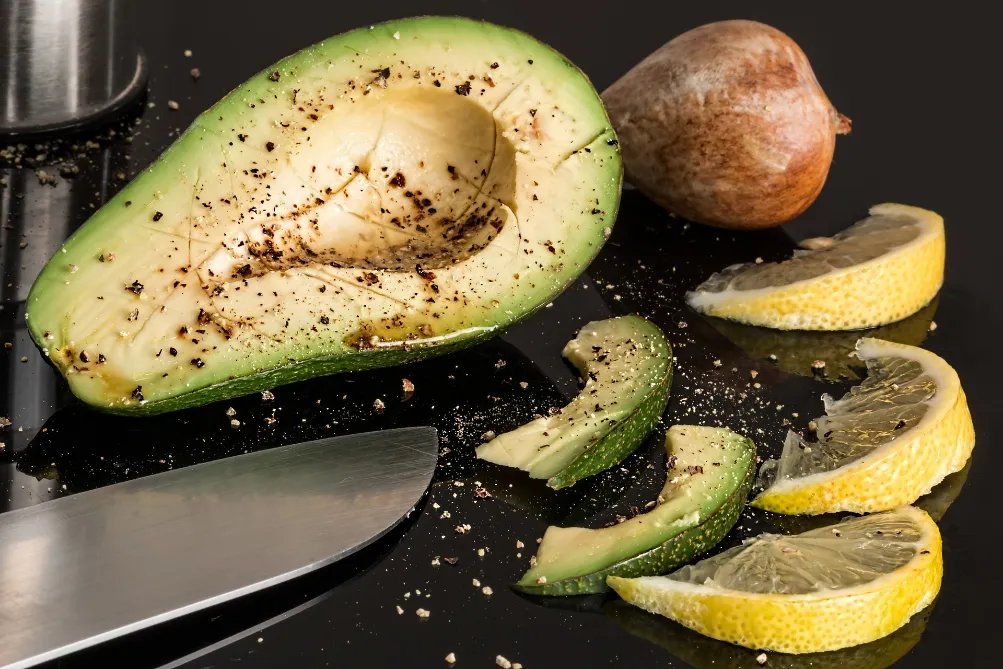
Dietary tweaks are a vital consideration when it comes to your health and overall well-being. The food you consume isn’t just about pleasing your taste buds. It plays a crucial role in determining your health and how you feel each day. Making even the tiniest adjustments to your diet can lead to a lower risk of chronic diseases, improved energy levels, and a more positive mood.
Here are 11 dietary tweaks that can help you live a longer, healthier life:
Table of Contents
1. Focus on adding more color to your plate
Eating a rainbow of fruits and veggies isn’t just visually appealing; it’s a nutrient powerhouse. Each color brings a unique set of vitamins and antioxidants that your body craves for good health.
Red: Reach for vibrant red peppers, tomatoes, and strawberries. These foods are packed with lycopene, an antioxidant known for its cancer-fighting properties.
Orange: Carrots, sweet potatoes, and oranges are rich in beta-carotene, which supports eye health and a robust immune system.
Yellow: Bananas and corn provide a burst of vitamin B6 and folate, essential for brain function and cell growth.
Green: Spinach and broccoli are green giants, brimming with vitamins K and C, vital for bone health and immune support.
Blue and Purple: Blueberries and grapes are your go-to choices here. Their deep hues signify an abundance of antioxidants that promote heart health.
White and Brown: Cauliflower and mushrooms belong to this category, offering essential minerals like potassium and selenium for a well-balanced diet.
2. Increase your intake of plant-based foods.
Plant-based foods are like nature’s nutritional treasure chest. They’re brimming with fiber, essential vitamins, minerals, and antioxidants. What’s more, they’re naturally low in saturated fats and cholesterol, making them a stellar choice for your health. Here’s a quick rundown of plant-based food categories:
Fruits: Sweet, juicy, and packed with vitamins and antioxidants, fruits like apples, bananas, and berries make excellent snacking options.
Vegetables: From leafy greens to colorful bell peppers, vegetables offer a wide array of nutrients. Broccoli, spinach, and carrots are your health allies.
Whole Grains: Whole grains like quinoa, brown rice, and oats are fiber-rich and provide sustained energy.
Legumes: Beans, lentils, and chickpeas are protein-packed legumes that also offer a healthy dose of fiber.
3. Focus on healthy fats.
Healthy fats, such as monounsaturated and polyunsaturated fats, can do wonders for your well-being. By embracing these sources of nourishment, you’re taking a proactive step to enhance your health in several ways.

Olive Oil: The Heart’s Best Friend
Extra virgin olive oil is not just a kitchen staple; it’s a potent elixir for your cardiovascular health. Rich in monounsaturated fats, it helps reduce bad cholesterol levels and lower the risk of heart disease. Drizzle it on salads or use it for cooking to add a touch of Mediterranean magic to your meals.
Avocado: The Creamy Cardio Protector
Avocado, with its creamy texture and rich flavor, is more than just a delicious addition to your dishes. It’s packed with heart-healthy monounsaturated fats, which can help improve your cholesterol profile and reduce the risk of stroke. Spread it on toast, add it to salads, or blend it into smoothies for a satisfying and nutritious boost.
Nuts: Tiny Powerhouses of Good Fats
Nuts, including almonds, walnuts, and pistachios, are not only convenient snacks but also reservoirs of healthy fats. They provide a satisfying crunch and a dose of monounsaturated and polyunsaturated fats that benefit your heart and brain. A small handful of nuts can keep your cravings at bay and nourish your body.
Seeds: Omega-3 Warriors for Brain and Joints
Flaxseeds and chia seeds are rich in omega-3 fatty acids, essential for brain health and reducing inflammation. These tiny powerhouses can be sprinkled on yogurt, added to smoothies, or incorporated into your baking to infuse your diet with these essential nutrients.
Oily Fish: A Sea of Omega-3 Benefits
Salmon, mackerel, and sardines are swimming with omega-3 fatty acids. These healthy fats support your cardiovascular system, reduce inflammation, and promote brain function. Including oily fish in your diet a few times a week is a delicious way to ensure your body gets these crucial nutrients.
4. Limit added sugar.
Too much sugar can lead to health troubles like obesity and heart issues. It’s crucial to watch your sugar intake. Extra sugars are hiding in some surprising spots, such as sweet drinks and processed foods. Soft drinks and sugary fruit juices are common sources of too much sugar. Processed foods, like snacks and sauces, can also have a lot of sugar. Check food labels for secret sugars, and pick products with less sweet stuff. Go for water or unsweetened drinks, and cook at home to have more control over your meals. You can still enjoy the natural sweetness of whole fruits and veggies, which are good for you. Reducing extra sugars can be sweet for your health.
5. Stay Well-Hydrated for Good Health
Drinking enough water is vital for your body to function properly. Aiming for around eight glasses of water each day is a good way to stay hydrated and support your body’s essential processes. It helps keep your skin healthy, your digestion smooth, and your energy up. So, remember to make water your go-to drink throughout the day. It’s like a refreshing sip of good health!
6. Eat foods that are often ignored

Some foods often don’t get the attention they deserve, but they are like treasure chests of essential nutrients. Let’s shine a light on a few of them:
Green leafy veggies: They’re rich in vitamins A, C, E, and K, along with minerals like iron, magnesium, potassium, and calcium.
Lean proteins: Foods like chicken, fish, beans, and tofu are crucial for building and repairing your muscles.
Dairy products: They offer protein, calcium, and other vitamins and minerals. So, don’t overlook these nutritious options—they’re like a health boost on your plate!
Herbs and Spices: Don’t forget to spice up your meals with herbs and spices like turmeric, cinnamon, and ginger. These flavorful additions are not only delicious but also offer potential health benefits, from reducing inflammation to aiding digestion.
Offal: While not for everyone, organ meats like liver and heart are nutritional heavyweights. They are packed with essential vitamins and minerals, such as iron, vitamin A, and zinc. According to your doctor and nutrition expert, if you’re open to trying them, you can unlock a world of nutrient-rich possibilities.
Also, read more here for in-depth knowledge.
7. Avoid processed foods
Steer clear of processed foods whenever you can. These items are frequently loaded with unhealthy fats, added sugars, and excessive salt. Sadly, they lack the valuable nutrients your body needs. Opt for fresh, whole foods to keep your diet clean and healthy.
Processed foods often come in colorful packaging, boasting convenience and flavor. While they may seem tempting, they are usually packed with harmful additives and excess calories. Think of sugary cereals, chips, and pre-packaged meals. These foods can lead to health issues like obesity, heart disease, and high blood pressure.
8. Eat mindfully
Embrace mindful eating as a way to connect with your food and body’s cues. This practice encourages you to be present during meals, leading to better food choices and a deeper appreciation for your culinary experience.
Mindful eating involves being fully engaged with your meal – from savoring the flavors and appreciating the textures, to acknowledging when you’re full. This approach fosters a healthier relationship with food and helps prevent overeating or emotional eating.
9. Cook more meals at home
Embrace home-cooked meals as a way to take charge of your diet. Preparing your own meals not only offers control over ingredients but also opens up opportunities to explore new recipes that cater to your specific tastes and dietary requirements.
When you cook at home, you choose the quality of ingredients, ensuring freshness and nutrition. Plus, you have the freedom to adjust portion sizes and create balanced meals. You can experiment with diverse flavors, making every dish a culinary adventure.
10. Eat with others

Eating is not just about fueling your body; it’s also a social experience. Sharing meals with friends and family can add joy and connection to your dining routine. It encourages you to eat slowly, savor each bite, and engage in meaningful conversations.
When you dine with others, it fosters a sense of togetherness, making mealtime a shared experience. This can promote a healthier relationship with food, as it shifts the focus from simply consuming calories to enjoying the flavors and companionship.
Sitting down for meals together can also help in portion control. Engaging in conversation and savoring the meal often prevents overeating, promoting mindful consumption. So, embrace the opportunity to connect over a shared plate and savor the delicious moments.
11. Be patient and consistent
Changing your dietary habits isn’t an overnight transformation; it’s a journey that requires patience and persistence. It’s entirely normal to encounter occasional setbacks or indulge in an occasional treat. The key is not to let these moments derail your overall progress.
Stay consistent in your efforts. If you slip up, acknowledge it and move forward. Avoid dwelling on mistakes; instead, focus on your long-term goals. Building healthier eating habits takes time, and small, steady steps are more sustainable than drastic changes.
Remember, every healthy choice you make contributes to your well-being. So, embrace your journey, be kind to yourself, and stay committed to achieving a healthier, happier you. With patience and consistency, your dietary tweaks will become lasting improvements in your life.
Additional Tips for a Dietary Tweaks
These additional tips for your dietary tweaks will not only enhance your health but also make the journey towards better eating habits an enjoyable one. Remember, every step you take towards a healthier diet is a step toward a better, more vibrant life.
1. Diversify Your Meal Plan
Create a 2-week rotating meal plan that includes a variety of protein sources, vegetables, and fruits. This approach ensures you receive a broad spectrum of nutrients essential for optimal bodily function.
2. Gradual Changes for Long-Term Success
Making small, gradual changes to your diet is the secret to long-term success. Instead of drastic, unsustainable alterations, focus on incremental improvements that you can maintain over time.
3. Embrace Culinary Exploration
Don’t shy away from trying new foods and recipes. The world of healthy eating is full of delicious and nutritious options. Experiment with different ingredients and cooking methods to discover what you enjoy most.

You Learned
Embracing these dietary tweaks isn’t just about a short-term change; it’s a long-term investment in your health. Take it one step at a time, be kind to yourself, and stay steadfast in your journey to a healthier and happier you. Your body and mind will thank you.
Note
Please note that the tips and guidance provided here are based on extensive research and reliable sources. We strongly recommend seeking advice from a healthcare professional or expert before incorporating them into your lifestyle.
Sources:
5 Foods That You Must Eat Every Day But Might Be Ignoring
Im a nutritional therapist – here are six dietary tweaks to extend your life
3 EATING TWEAKS THAT BRING BIG BENEFITS
8 healthy tweaks to make your diet today, according to nutritionists








